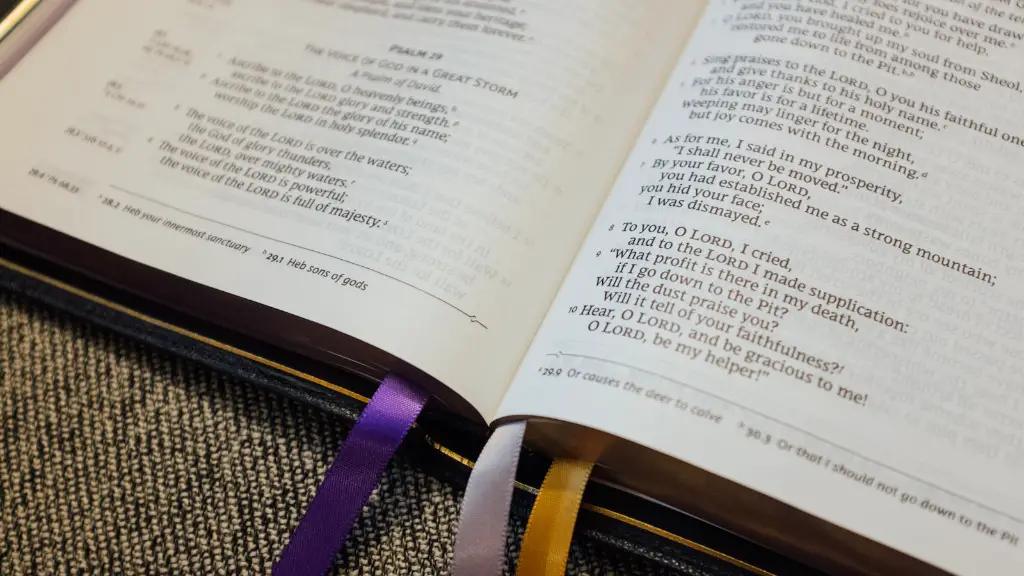Does The Bible Mention Homosexuality?
Historians estimate that the Bible was written approximately 1500 BC, and comprise both the Old Testament and the New Testament which were written around 400 AD. Despite the many millennia of separation between the books, the Bible is often seen by many as a collection of documents – some of them inspired by God – that provide critical guidance and law under which we are to live our lives. One of the topics addressed in this ancient text is that of homosexuality – so did it mention it, and if so what did it say?
To answer this question, we must look at the Bible in context of the time in which it was written. In general, it was more socially acceptable for men to be physically affectionate towards other men than for a man and woman to show public displays of affection. As such, many of the interactions between men that may have been interpreted as homosexual in nature were simply friendships. In the Old Testament, many of the relationships described are that of close male friends – such as Jonathan and David in the story of David and Goliath – which may have been later interpreted as a homosexual partnership but are more likely just examples of close friendships. Similarly, in modern societies there is often confusion about some of the relationships between Jesus and his disciples as there is no concrete evidence of a physical relationship existing between any of them, however this is likely to be pure speculation.
The Bible does, however, mainly talk of homosexuality in the context of it being a sinful act. Leviticus 18:22 and Leviticus 20:13 – two of the most commonly referenced passages in terms of homosexual acts – both state that such sex is an abomination and those who commit it are to be “put to death”. One perspective is therefore that homosexually is a sin against God, and that it should not be tolerated in any form or circumstance.
Many Christians and Christian organizations view this stance as outdated and outmoded by today’s standards, and are of the opinion that such passages should not be applied in modern society. Many religious leaders now advocate for love, acceptance and understanding in the context of all relationships, regardless of sexual orientation, and view homosexuality as something to be neither celebrated nor shamed.
Social scientists have also gathered data which suggests that homosexuality is a natural expression of sexuality and that same-sex relationships have existed since ancient times. Recently, many studies have explored the science and biology of human sexuality, which has not only revealed how fluid, diverse and complex sexual orientation can be, but how it is, in many ways, biological. However, there remains a significant portion of the population who continue to believe in the traditional interpretation of the Bible’s stance on homosexuality.
The debate on this topic shows no signs of ending any time soon, and there are numerous interpretations of how the scripture is to be applied in modern times. However, while many might argue that the Bible condemns homosexuality, the reality is much more nuanced than a black and white interpretation.
What Do The Bible’s Translations Say About Homosexuality?
The ancient Bible passages that mention homosexuality have been translated in various ways, ranging from acceptance to rejection. The New International Version, for example, has a significantly more conciliatory tone towards homosexuals than the King James Version. There are a number of passages which describe same-sex relationships positively, such as the story of ‘Ruth and Naomi’. Similarly, some versions of the Bible say that the Lord created humans to be in loving relationships with each other without gender-specific language, which suggests that unions between two people of the same sex should be accepted.
Other translations, such as the Common English Bible, translate Leviticus 18 with a much stricter tone and imply that same-sex relationships are sinful and wrong. It should be noted, however, that many of these translations were written or revised in recent decades and may be influenced by the cultural biases of their creators. As such, some faith leaders suggest that it is important to read the scripture in context and question the accuracy of certain translations that may come across as judgemental.
The Bible also provides examples of how the church should view homosexuality, such as Jesus talking to a homosexual at a well in the gospels, or Paul’s letters which talk about judging and not condemning those who live in this lifestyle. While these passages may be seen by some as a sign that homosexuality is acceptable, it is also noteworthy that in many cases, the words used in these passages may also be interpreted as an admonishment for engaging in what is seen as a sin.
In conclusion, many believe that the Bible does indeed mention and condemn homosexuality, even though it is important to take into account the contextual time period and the many translations into modern times. It is clear that, while most Christians would agree that same-sex relationships are not encouraged or celebrated, there is significant disagreement among them as to the importance of this biblical instruction in the contemporary world.
Are There Homosexuals Mentioned in The Bible?
The Bible does not explicitly mention any homosexual individuals, but there are a number of passages that reference relationships between individuals of the same sex. In addition, there is an account in Judges 19 of a Levite from the tribe of Dan who, when visiting a city, is offered a male concubine as an alternative to getting a wife. This passage has been widely interpreted by many as an example of a homosexual relationship.
In Corinthians 6, the Bible makes a reference to any individual wanting to practice “unlawful” sex, which some scholars believe includes same-sex attraction. Another passage that is often quoted is 1 Timothy 1:10 which warns against “men practicing homosexuality,” although this may be interpreted differently based on the particular translation being used. This can be seen as a clear rebuke to individuals engaging in same-sex relations, but some evangelicals point to the fact that this is in context of a broader condemnation of all sins.
It is also worth noting that the Bible mentions many people throughout its pages, either in passing or by name. While none of them are specifically identified as homosexual, some may have lived in same-sex relationships and practised the lifestyle in private, but this cannot be known for certain.
In conclusion, the Bible does mention homosexuality but whether or not it is condemed depends largely on the interpretation of the passage. It is also likely that some individuals who lived during biblical times may have lived in same-sex relationships, although there is no concrete evidence to support this.
The Implications of the Bible’s Teaching on Homosexuality
When discussing the implications of the Bible’s teaching on homosexuality, it is important to look at it in two distinct ways. Firstly, there is the religious implication, which can be summarised by the belief that engaging in homosexual behaviour is an offence against God and is therefore a sin. This view is held by some conservative Christians and other religious groups who interpret the scriptures as condemning same-sex relationships.
The second implication of this teaching is the social and cultural one. This perspective looks at homosexuality from a secular point of view, and suggests that the Bible’s instructions may be outdated and offensive in a modern context, particularly when considering the fact that many people have come out openly and are comfortable with their sexual orientation. Groups such as Rainbow Christians and other advocacy groups have argued that the teaching from the Bible should be interpreted differently, as a way of accepting and understanding this increasingly embraced identity.
It is also worth noting that the Bible’s teaching on homosexuality is often seen as being a source of conflict amongst people of faith, with some preferring to adopt a liberal interpretation and others opting for a more traditional approach. This tension can lead to the further marginalization of those who identify as homosexual, alienating them even further from the faith community.
Ultimately, the implications of the Bible’s teaching on homosexuality depend largely on the interpretation of the passages in question. While some may see it as a condemnation of same-sex relationships, others may take a more liberal stance and see it as a call to tolerate and accept those with different sexual orientations. With advances in science and understanding, it is possible that this debate may soon become a thing of the past.
What Does the Bible Say About Same-Sex Marriages?
The Bible does not explicitly mention marriages between two individuals of the same sex, but the references to homosexuality in the Old and New Testament could be interpreted to mean that such relationships are sinful and should not be practiced. This interpretation is widely held by many conservative Christians, who believe that marriage should remain a union between a man and woman only, although some churches have been more willing to accept same-sex unions.
That said, some prominent figures in the Christian faith have argued that same-sex marriage could be viewed as a sacred calling, with the emphasis being on the love and commitment that is shared between two individuals rather than their gender. Others have accepted same-sex marriages as long as they do not involve sexual contact, arguing that it is the physical aspect of the relationship and not the emotional aspect that is seen as being a violation of the scripture.
Furthermore, many religious experts point out that the Bible does not differentiate between different types of marriage, so there is no mention of same-sex marriage specifically, or any other type of marriage, in the scriptures. This leads some to suggest that same-sex marriages should be treated in the same way as heterosexual unions and accepted as a valid and legitimate form of partnership.
It is clear that there are deep divisions amongst those of faith, and the issue of same-sex marriages is likely to remain a contentious issue for some time. What is certain, however, is that it is an issue to be discussed, accepted and, ultimately, respected.
Can Same-Sex Marriages Be Blessed by The Church?
The debate on whether or not same-sex marriages can be blessed by the church has been a long-running one, with many churches deciding to uphold traditional views whilst others are more accepting of modern interpretations. The official stance of many mainstream Christian denominations is that marriage should remain a union between one man and one woman, however some have opened their doors to same-sex weddings, albeit with a few caveats.
The Catholic Church, for example, does not allow priests to officiate same-sex weddings, arguing that it is a violation of church doctrine. On the other hand, the Episcopal Church in the United States has welcomed same-sex couples who wish to be married in their churches, recognizing the need to treat all couples with love, understanding and respect. A similar stance has been adopted by the United Church of Christ, which recognizes same-sex marriages and is willing to bless them.
Nevertheless, it is important to bear in mind that marriage is seen differently in the eyes of the law depending on the country, state or culture in which one lives. For example, while many churches may now bless same-sex marriages, in some countries such unions are still not legally recognized. Ultimately, it is up to each individual church to decide how it wishes to approach this issue.
In conclusion, there is a wide range of opinions on this issue among both clergy and lay people within the Christian faith





